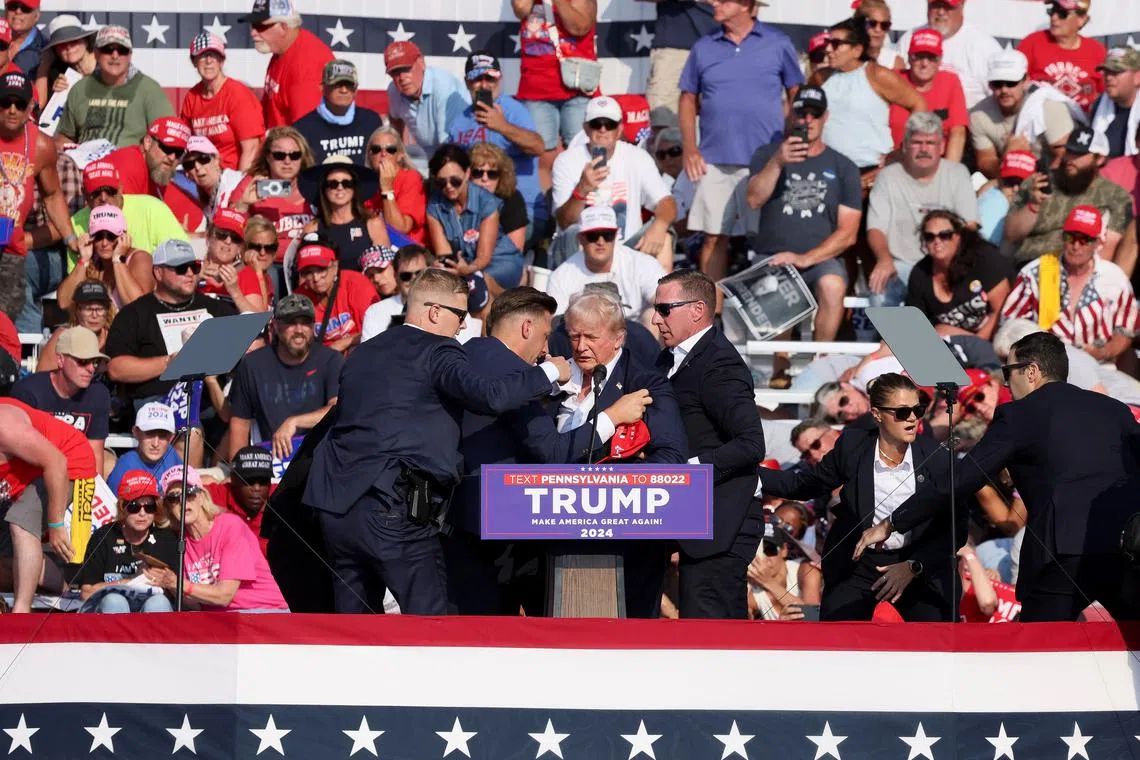Reuters fact-checks online rumours about Trump assassination attempt
Sign up now: Get ST's newsletters delivered to your inbox

Secret Service agents surrounding presidential candidate Donald Trump after he was shot in the right ear at a campaign rally in Butler, Pennsylvania, on July 13.
PHOTO: REUTERS
Misinformation and conspiracy theories were spreading online after an assassination attempt on former US president Donald Trump
Thomas Matthew Crooks, 20, One spectator died
Reuters has fact-checked some of the most widely shared narratives online.
Misidentified shooters
Within hours of the shooting, an image surfaced online of a man dressed in a black sweatshirt, hat and black sunglasses. Social media posts said the man was “Antifa extremist” Mark Violets and that he was named by local police as the suspect in the assassination attempt.
However, the man in the photograph is Mr Marco Violi, who had nothing to do with the shooting. Mr Violi is an Italian sports writer who shares content on Italian soccer team AC Roma.
In a statement e-mailed to Reuters and shared on his social media pages, Mr Violi said he was in Rome and had awoken at 2am to numerous messages, adding that he “categorically denied any involvement in the situation”.
Mr Violi was not the only individual to have been misidentified in the immediate aftermath of the shooting.
Viral posts also misidentified another man, Maxwell Yearick, as the shooter. In 2016, various media outlets reported that Yearick, who does not resemble Crooks, was arrested outside a Trump rally in Pittsburgh after an altercation with police.
Altered images, false claims shooting was staged
Doctored images of Trump and Secret Service agents smiling on stage surfaced in the immediate aftermath of the shooting. The fake images were shared to support claims that the assassination attempt had been “staged” as a ploy to boost Trump’s popularity in November’s election.
The original photographs were captured by an Associated Press photographer and show Trump and the agents with serious facial expressions.
The Federal Bureau of Investigation on July 14 said Crooks acted alone and that the agency had yet to identify a motive.
Predictive programming conspiracy theories
Predictive programming is a conspiracy theory, often revived in the aftermath of a major news event, that suggests governments and powerful groups provide indications of planned events to the public by embedding predictions in books, TV shows and movies.
Within an hour of the attempted assassination, a fabricated screenshot resurfaced of a cartoon of Trump in a casket and was described as a scene from TV series The Simpsons.
But this image has made the rounds on social media since at least 2017.
Mr Matt Selman, an executive producer for the show, told Reuters in an e-mail that the screenshot never appeared on the show, adding that it was “all too easy to create fake Simpsons ‘predictions’ like these for the purpose of misleading people”.
A spokesperson for Trump did not immediately respond to a request for comment. REUTERS


